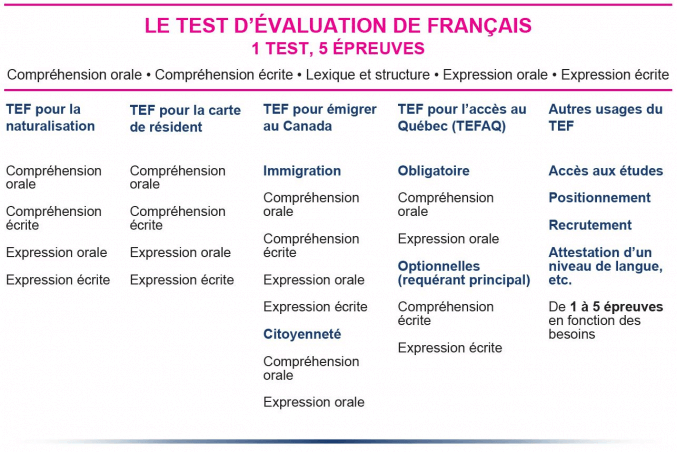"I chose to take the DELF A2 because I wanted to know if I could really pass it, and to continue to progress in my classes. It was gratifying to know that I had passed and that I had obtained an accreditation by a global standard."
EXAMS AND CERTIFICATIONS
Registration is now open!
The Alliance Française offers three types of exams and diplomas: The DELF/DALF exam, DELF Jr. (11-16 years), and the TEF exams which can be taken for a variety of academic, proffessional, and personal reasons.
The DELF (Diplôme d’Etudes en Langue Française) and the DALF
(Diplôme Approfondi en Langue Française) are official diplomas awarded by the French Ministry of Education
to certify foreign candidates’ proficiency in French. The exams are useful for school records and college and
job applications in French-speaking countries.
The Exams are given 3 times per year, in March, June, and December. See dates for adults and for DELF Junior (Middle and High School age) below.
Learn more about the DELF exams on the official French governmental page.
The Test d’Évaluation de Français (TEF ) is a test of general French which
assesses the level of proficiency in French of francophones and non-francophones alike.Created in 1998 by the Paris Ile-de-France Chamber
of Commerce and Industrie, TEF is an international benchmark test that measures your level of knowledge and skills in French. It is
recognised as official proof of language proficiency by Citizenship and Immigration Canada (CIC) as well as by the Ministère de
l’Immigration et des Communautés Culturelles du Québec (MICC) for permanent residency applications, Certificat de Sélection du Québec
applications and Canadian citizenship applications. - Learn more about the TEF on the official Français des Affaires page.
What is the DELF/DALF?
The Diplôme d’études en langue française (DELF or Diploma of French Language Studies) is an internationally recognized French Language Proficiency Certificate awarded by France’s national Ministry of Education. It consists of a series of independent assessments based on a scale of language proficiency defined in the Common European Framework of Reference (CEFR), a framework used in second language learning around the world. DELF evaluators are teachers trained and accredited by France’s Centre international d’études pédagogiques.
DELF assessments exist in different versions adapted for children, teenagers and adults. All versions respect the same format and standards but content and themes vary. For teenagers, there are the DELF Junior and DELF Scolaire versions offered at four of the six CEFR levels of language proficiency. These are identical assessments; Junior for individuals, Scolaire for schools.
Six Levels of Language Proficiency
| Basic Language User | ||
| A1 | Recognizes basic language ability where the user can interact in a simple way. | DELF** A1 |
| A2 | Recognizes the linguistic competency of a basic user who can communicate socially. | DELF** A2 |
| Independent Language User | ||
| B1 | Recognizes a language user who can manage with some independence in most situations encountered while travelling. | DELF** B1. |
| B2 | Recognizes a language user who is able to communicate independently in most situations: construct arguments, defend opinions, explain viewpoints and negotiate. | DELF** B2. |
| Proficient User | ||
| C1 | Recognizes an independent language user, fluent, spontaneous; extensive vocabulary; clear, well-structured discourse without hesitation. | DALF*** C1. |
| C2 | Recognizes an advanced language user; precise, fluent, sophisticated use in advanced-level and academic situations. | DALF*** C2. |
*Common European Framework of Reference for Languages (CEFR)
*Diplôme d’études en langue français (DELF)
***Diplôme approfondi de langue française (DALF)
The DELF scolaire does
not assess the two highest levels of proficiency in the CEFR, C1 and C2. These are assessed in the Diplôme
approfondi de langue française (DALF),
an assessment for advanced and adult language learners.
Why take the DELF/DALF?




Why are people taking the DELF at the Alliance Française?
"I chose to take the DELF A2 because I wanted to know if I could really pass it, and to continue to progress in my classes. It was gratifying to know that I had passed and that I had obtained an accreditation by a global standard."

What is the TEF?
The Test d’Évaluation de Français (TEF ) is a test of general French which assesses the level of proficiency in French of francophones and non-francophones alike. Created in 1998 by the Paris Ile-de-France Chamber of Commerce and Industrie, TEF is an international benchmark test that measures your level of knowledge and skills in French.
The TEF is officially recognized by :
- the French Ministry of Education
- the Ministry of Higher Education, Research and Innovation
- the French Ministry of the Interior
- the Department of Immigration, Refugees and Citizenship of Canada
- the Quebec Ministry of Immigration, Francisation and Integration
- the Swiss State Secretariat for Migration
The TEF assesses the candidate’s proficiency in French using a 7 level scale based on the Common
European Framework of Reference for Languages (CECRL) and
the Canadian Language Benchmarks (CLB).
It consists of 4 modules: listening, speaking, reading and/or writing
Please read the terms and conditions thouroughly before enrolling.
What is the TEF?
The TEF consists of 5 parts* :
- Oral comprehension (CO)
- Written comprehension (CE)
- Oral Expression (EO) – 2 topics
- Written Expression (EE) – 2 topics
- Vocabulary and syntax (LS)
*According to your goals and the formalities you need to complete, you can choose the TEF version that includes the tests you require.
Why take the TEF?
The TEF provides confirmation of one’s level of competency in French in any professional, academic or mobility-related
context,
and in particular for:
- Studying in France with the TEF Études
- Obtaining French nationality with the TEF Naturalisation
- Emigrating to Canada and obtaining Canadian citizenship with the TEF Canada
- Emigrating to Quebec with the TEF Québec – TEFAQ
Design by Monsieur Graphic. Powerd by Oncord




